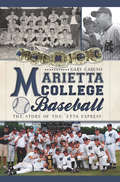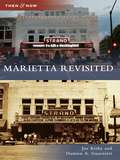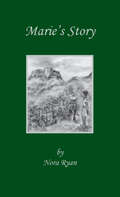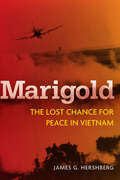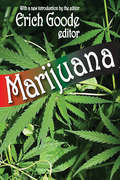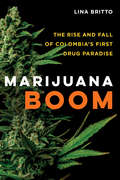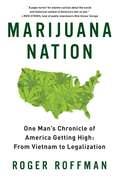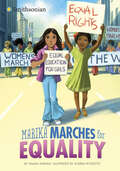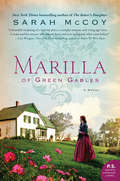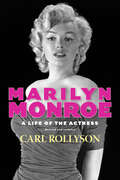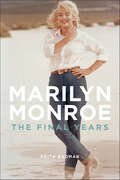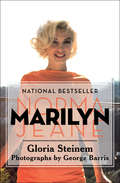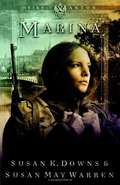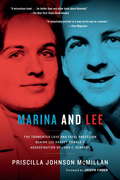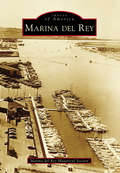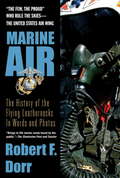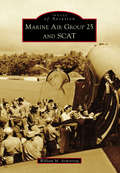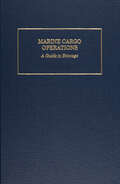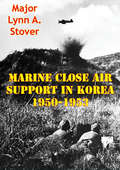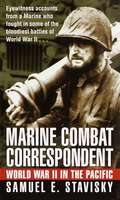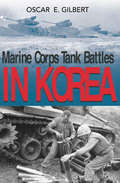- Table View
- List View
Marietta College Baseball: The Story of the 'Etta Express (Sports)
by Gary CarusoNestled at the confluence of the Muskingum and Ohio Rivers in the first permanent settlement in the Northwest Territory resides one of the most dominant college baseball dynasties in the nation. The Marietta College Pioneers--known as the 'Etta Express for the way they've barreled over opponents for half a century--own a record five NCAA Division III National Championships, including 2011. Finally, the best-kept secret in college sports springs to life as author Gary Caruso digs into the personalities behind this incredible success story to reveal the compelling human drama that's made Marietta College baseball a treasure all readers are sure to enjoy.
Marietta Revisited (Then and Now)
by Damien A. Guarnieri Joe KirbyMarietta is one of the largest and most historic cities in northwest Georgia. Some of that history has been preserved, but much of it, unfortunately, has been lost to "progress," as the photographs in Then and Now: Marietta Revisited attest.
Marie’s Story
by Nora Ryan Therese MilisSet in Haiti, Marie's Story that puts a human face on AIDS and brings the reader into the lives of children, illuminating their struggles and triumphs in a haphazard and uncertain world.
Marigold: The Lost Chance for Peace in Vietnam
by James HershbergMarigold presents the first rigorously documented, in-depth story of one of the Vietnam War's last great mysteries: the secret peace initiative, codenamed "Marigold," that sought to end the war in 1966. The initiative failed, the war dragged on for another seven years, and this episode sank into history as an unresolved controversy. Antiwar critics claimed President Johnson had bungled (or, worse, deliberately sabotaged) a breakthrough by bombing Hanoi on the eve of a planned secret U.S.-North Vietnamese encounter in Poland. Yet, LBJ and top aides angrily insisted that Poland never had authority to arrange direct talks and Hanoi was not ready to negotiate. This book uses new evidence from long hidden communist sources to show that, in fact, Poland was authorized by Hanoi to open direct contacts and that Hanoi had committed to entering talks with Washington. It reveals LBJ's personal role in bombing Hanoi as he utterly disregarded the pleas of both the Polish and his own senior advisors. The historical implications of missing this opportunity are immense: Marigold might have ended the war years earlier, saving thousands of lives, and dramatically changed U.S. political history.
Marijuana
by Erich GoodeMarijuana seeks to bring to the reader the whole configuration of this problem, which, like the Sexual Revolution and the New Politics, was at the heart of the alienation felt by many young people during the second half of the 1960s and the fears of social breakdown voiced by many of their elders.The book, first published in 1969, describes the history of marijuana use, how the drug was distributed in this country, the extent and patterns of its use by students and other groups, its possible connection with crime and drug addiction, and the widely differing arguments of its foes and supporters. It is replete with first-hand accounts by people who smoked and sold marijuana, as well as by those who studied the phenomenon from socio logical, psychiatric, legal, educational, and other viewpoints.Much of the work published on marijuana has dealt with its chemical, medical, pharmacological, and agricultural aspects. While these approaches are necessarily touched upon here, the focus of this still timely volume is sociological; it is the only anthology from the period to concentrate on this aspect, to present articles topically, and to deal with all points of view. The new introduction by the editor reviews contemporary uses of marijuana and discusses how attitudes about it have changes. Marijuana is a fascinating and informative book for everyone, and it is a particularly valuable addition to courses in introductory sociology, social problems, social deviance, disorganization, social pathology, and criminology.
Marijuana Boom: The Rise and Fall of Colombia's First Drug Paradise
by Lina BrittoBefore Colombia became one of the world’s largest producers of cocaine in the 1980s, traffickers from the Caribbean coast partnered with American buyers in the 1970s to make the South American country the main supplier of marijuana for a booming US drug market, fueled by the US hippie counterculture. How did Colombia become central to the creation of an international drug trafficking circuit? Marijuana Boom is the story of this forgotten history. Combining deep archival research with unprecedented oral history, Lina Britto deciphers a puzzle: Why did the Colombian coffee republic, a model of Latin American representative democracy and economic modernization, transform into a drug paradise, and at what cost?
Marijuana Nation: From Vietnam to Legalization
by Roger RoffmanFor Roger Roffman, a retired university professor, there's nothing academic in the stories told in his memoir. It was personal when Roffman struggled with his own compulsive pot use and when he lost his younger brother to a drug overdose. It's personal when he challenges those who say marijuana is harmless. It's personal when he asks: If criminal penalties have been ineffective in protecting young people and the public's health and safety, might a well-designed and well-regulated legal market do better? For 45 years, Roffman has worn a multitude of hats, all related to his fascination with marijuana: the first to survey soldiers about their pot use in Vietnam, activist working to reform the laws, federally-funded marijuana dependence researcher, addiction therapist, drug educator, and - for a while - even a dealer who helped cancer patients learn about pot. It began in Vietnam where, as an Army officer in 1967, he questioned the prison terms meted out to soldiers who got high, while at every military base in the country booze was cheap and readily available. Roffman has experienced the layered and complex relationship Americans have with marijuana first-hand. His stories offer all too rare balanced insights about a drug that directly or indirectly has affected virtually all of us living in Marijuana Nation.
Marika
by Andrea Cheng"Although she has been raised Catholic, Marika learns how dangerous it is to be of Jewish heritage and living in Hungary during World War II." - from the book
Marika Marches for Equality (Smithsonian Historical Fiction)
by Salima AlikhanMiddle-schooler Marika is caught between two worlds. She and her friend Beth are passionate about women’s rights, and they plan to join a national rally to support the cause. But it’s 1970, and the equal rights movement has a lot of resistance—including from Marika’s parents. Marika wishes they were as supportive of equal rights as Beth’s parents, but Marika’s parents seem content with how things are. As the day of the Women’s Strike for Equality approaches, will Marika convince her parents to support her beliefs?
Marilla of Green Gables: A Novel
by Sarah McCoyA bold, heartfelt tale of life at Green Gables . . . before Anne: A marvelously entertaining and moving historical novel, set in rural Prince Edward Island in the nineteenth century, that imagines the young life of spinster Marilla Cuthbert, and the choices that will open her life to the possibility of heartbreak—and unimaginable greatness.Plucky and ambitious, Marilla Cuthbert is thirteen years old when her world is turned upside down. Her beloved mother dies in childbirth, and Marilla suddenly must bear the responsibilities of a farm wife: cooking, sewing, keeping house, and overseeing the day-to-day life of Green Gables with her brother, Matthew and father, Hugh.In Avonlea—a small, tight-knit farming town on a remote island—life holds few options for farm girls. Her one connection to the wider world is Aunt Elizabeth "Izzy" Johnson, her mother’s sister, who managed to escape from Avonlea to the bustling city of St. Catharines. An opinionated spinster, Aunt Izzy’s talent as a seamstress has allowed her to build a thriving business and make her own way in the world.Emboldened by her aunt, Marilla dares to venture beyond the safety of Green Gables and discovers new friends and new opportunities. Joining the Ladies Aid Society, she raises funds for an orphanage run by the Sisters of Charity in nearby Nova Scotia that secretly serves as a way station for runaway slaves from America. Her budding romance with John Blythe, the charming son of a neighbor, offers her a possibility of future happiness—Marilla is in no rush to trade one farm life for another. She soon finds herself caught up in the dangerous work of politics, and abolition—jeopardizing all she cherishes, including her bond with her dearest John Blythe. Now Marilla must face a reckoning between her dreams of making a difference in the wider world and the small-town reality of life at Green Gables.
Marilyn Monroe: A Life of the Actress, Revised and Updated (Hollywood Legends Series)
by Carl RollysonIn American popular culture, Marilyn Monroe(1926–1962) has evolved in stature from movie superstar to American icon. Monroe's own understanding of her place in the American imagination and her effort to perfect her talent as an actress are explored with great sensitivity in Carl Rollyson's engaging narrative. He shows how movies became crucial events in the shaping of Monroe's identity. He regards her enduring gifts as a creative artist, discussing how her smaller roles in The Asphalt Jungle and All About Eve established the context for her career, while in-depth chapters on her more important roles in Bus Stop, Some Like It Hot, and The Misfits provide the centerpiece of his examination of her life and career. Through extensive interviews with many of Monroe's colleagues, close friends, and other biographers, and a careful rethinking of the literature written about her, Rollyson is able to describe her use of Method acting and her studies with Michael Chekhov and Lee Strasberg, head of the Actors' Studio in New York. The author also analyzes several of Monroe's own drawings, diary notes, and letters that have recently become available. With over thirty black-and-white photographs (some published for the first time), a new foreword, and a new afterword, this volume brings Rollyson's 1986 book up to date. From this comprehensive, yet critically measured wealth of material, Rollyson offers a distinctive and insightful portrait of Marilyn Monroe, highlighted by new perspectives that depict the central importance of acting to the authentic aspects of her being.
Marilyn Monroe: The Final Years
by Keith BadmanPublished for the fiftieth anniversary of her tragic death, this definitive account dispels the rumors and sets the record straight on her last two yearsMarilyn Monroe passed away at the age of thirty-six under circumstances that have remained mysterious to this day. Marilyn Monroe: The Final Years separates the myths and rumors from the facts as Keith Badman takes readers through the concluding months of 1960 to that fateful day in August 1962. In this extraordinary book—the product of five years of exhaustive research—the author is both biographer and detective: Badman uncovers long-lost or previously unseen personal records, exclusive interviews, and eyewitness accounts that illuminate the final chapter of Marilyn's life as she navigates weight gain, drug use, an dpersonal turmoil, along with drama on the set of the ill-fated movie Something's Got to Give. Badman dispels popular beliefs, such as her supposed affairs with John and Bobby Kennedy. (Monroe only had a one-night stand with the president at Bing Crosby's house, and never with Bobby.) Readers learn the long-concealed identity of her biological father, who refused Marilyn's attempt to contact him in 1951—and was then repaid with her apathy ten years later when he attempted to contact her. The author also reveals the details of her famous "last Sitting" with photographer Bert Stern (which was not her last photo shoot) and describes the horror she endured after being tricked into being institutionalized at the Payne-Whitney Psychiatric Clinic, from which ex-husband Joe DiMaggio had to pull strings to secure her release. Perhaps most shockingly, we learn of the regrettable incident in which a drunken Monroe was sexually exploited by mobsters at a Lake Tahoe hotel co-owned by Frank Sinatra. Finally contrary to the salacious rumors that Marilyn was suicidal or the victim of a murder and cover-up, Badman discloses new information about her final days alive and reveals, in unequivocal detail, evidence that indicates Monroe's death was accidental. Above it all, Badman pays homage to Monroe by rescuing her final months from the realm of wild and sensationalized allegations popularized by those who sought to gain from them. Marilyn Monroe: The Final Years sheds new light on an immortal movie legend.
Marilyn: Norma Jeane
by Gloria SteinemThe feminist icon and New York Times–bestselling author offers an intimate appraisal of the ultimate sex symbol—and the real woman behind the images. Few books have altered the perception of a celebrity as much as Marilyn. Gloria Steinem, the renowned feminist who inspired the film The Glorias, reveals that behind the familiar sex symbol lay a tortured spirit with powerful charisma, intelligence, and complexity. This national bestseller delves into a topic many other writers have ignored—that of Norma Jeane, the young girl who grew up with an unstable mother, constant shuffling between foster homes, and abuse. Steinem evocatively recreates that world, connecting it to the fragile adult persona of Marilyn Monroe. Her compelling text draws on a long, private interview Monroe gave to photographer George Barris, part of an intended joint project begun during Monroe&’s last summer. Steinem&’s Marilyn also includes Barris&’s extraordinary portraits of Monroe, taken just weeks before the star&’s death. &“An even-handed introduction to the Monroe phenomenon.&” —Library Journal
Marilyn: Norma Jeane
by Gloria SteinemThe feminist icon and New York Times–bestselling author offers an intimate appraisal of the ultimate sex symbol—and the real woman behind the images. Few books have altered the perception of a celebrity as much as Marilyn. Gloria Steinem, the renowned feminist who inspired the film The Glorias, reveals that behind the familiar sex symbol lay a tortured spirit with powerful charisma, intelligence, and complexity. This national bestseller delves into a topic many other writers have ignored—that of Norma Jeane, the young girl who grew up with an unstable mother, constant shuffling between foster homes, and abuse. Steinem evocatively recreates that world, connecting it to the fragile adult persona of Marilyn Monroe. Her compelling text draws on a long, private interview Monroe gave to photographer George Barris, part of an intended joint project begun during Monroe&’s last summer. Steinem&’s Marilyn also includes Barris&’s extraordinary portraits of Monroe, taken just weeks before the star&’s death. &“An even-handed introduction to the Monroe phenomenon.&” —Library Journal
Marina
by Carlos Ruiz ZafonThe novel Carlos Ruiz Zafón wrote just before THE SHADOW OF THE WIND.'Fifteen years on, the remembrance of that day has returned to me. I have seen that boy wandering through the mist of the railway station, and the name of Marina has flared up again like a fresh wound. We all have a secret buried under lock and key in the attic of our soul. This is mine...'In May 1980, 15-year-old Oscar Drai suddenly vanishes from his boarding school in the old quarter of Barcelona. For seven days and nights no one knows his whereabouts... His story begins in the heart of old Barcelona, when he meets Marina and her father German Blau, a portrait painter. Marina takes Oscar to a cemetery to watch a macabre ritual that occurs on the fourth Sunday of each month. At 10 a.m. precisely a coach pulled by black horses appears. From it descends a woman dressed in black, her face shrouded, wearing gloves, holding a single rose. She walks over to a gravestone that bears no name, only the mysterious emblem of a black butterfly with open wings. When Oscar and Marina decide to follow her they begin a journey that will take them to the heights of a forgotten, post-war Barcelona, a world of aristocrats and actresses, inventors and tycoons; and a dark secret that lies waiting in the mysterious labyrinth beneath the city streets.Read by Daniel Weyman. Daniel appears in Foyle's War for itv as series regular Adam Wainwright. His many other television appearances include Poirot, Midsomer Murders and Dunkirk. He was nominated for Best Performance in a Play at the TMA Awards for his portrayal of Nicholas Nickleby which played at Chichester Festival Theatre, in the West End and in Toronto. His first professional job was at the Donmar Warehouse in The Vortex directed by Michael Grandage. He has recorded many audiobooks and was included in the ALA's Listen List 2013 for outstanding narration.(p) 2013 Orion Publishing Group
Marina (Heirs of Anton #3)
by Susan May Warren Susan K. DownsWhere is the God who promised to protect the heirs of Anton? Marina Shubina believes God has abandoned her. She's widowed and pregnant--and Hitler's Third Reich has just invaded Russia. As a partisan, she's ready to give her life for the Motherland, but what will become of her unborn child? OSS agent Edward Neumann has one chance to redeem his mistakes in Berlin... destroy the German supply lines into Moscow. Unfortunately his mission depends on a Russian partisan, a sharp-shooter named Marina. But does God have a bigger plan for him? And will this plan cost him the woman he loves?
Marina and Lee
by Joseph Finder Priscilla Johnson McmillanThe inside story of Lee Harvey Oswald's path to killing John. F. Kennedy. Reissued to mark the 50th anniversary of the Kennedy assassination, Marina and Lee is an indispensable account of one of America's most traumatic events, and a classic work of narrative history. In her meticulous, at times even moment by moment, account of Oswald's progress toward the assassination, Priscilla Johnson McMillan takes us inside Oswald's fevered mind and his manic marriage. When Marina, only a few weeks after giving birth to their second child, hears of Kennedy's death and discovers that Lee's rifle is missing from the garage where it was stored, she knows that her husband has killed the President. McMillan came to the story with a unique knowledge of the two main characters. In the 1950s she had worked for Kennedy and had known him well for a time. Later, working in Moscow as a journalist, she interviewed Lee Harvey Oswald during his attempt to defect to the Soviet Union. When she heard his name again on November 22, 1963, she said, "My God! I know that boy!" Marina and Lee was written with the complete and exclusive cooperation of Oswald's Russian-born wife, Marina Prusakova, whom McMillan debriefed for seven months in the immediate aftermath of the President's assassination and her husband's nationally televised execution at the hands of Jack Ruby.The truth is far more compelling, and unsettling, than the most imaginative conspiracy theory. Marina and Lee is a human drama that is outrageous, heartbreaking, tragic, fascinating. . . and real.From the Trade Paperback edition.
Marina del Rey
by Marina del Rey Historical SocietyTo increase trade to the Orient, commercial harbor development in the Ballona wetlands of western Los Angeles was attempted several times from 1880 to 1900, only to be destroyed by disastrous storm-fed floods. After the US Army Corps of Engineers installed revetments on Ballona Creek and moved tons of earth to raise the ground above sea level, Marina del Rey was federally authorized in 1954. Funded by federal, state, and Los Angeles County funds, the largest man-made marina in the nation was built to provide public recreational boating facilities and water access. Private financiers developed restaurants, hotels, premier yacht clubs, Fisherman's Village, and a residential marina lifestyle on county-owned leaseholds. This world-class seaport will celebrate 50 years of dynamic growth on April 10, 2015.
Marine Air
by Robert F. DorrThe U.S. Marine Air Wing began in 1917 with only five officers and 30 enlisted men. During WWII, it grew to 61 squadrons and over 10,000 pilots. Flying slow, cumbersome Grumman Wildcats against the far superior Japanese Zero, Marine pilots used hit-and-run tactics with deadly effect during some of the war's hardest battles-Guadalcanal, Wake Island, and Midway. By August 1943, Marine air superiority was established. <P><P>At the war's end, 125 Marines were air aces and eight had won Medals of Honor- including top ace Major "Pappy" Boyington, whose "Black Sheep Squadron" challenged Japanese fighters to combat on their own radio frequencies. From Vietnam to Operation Iraqi Freedom, the Marines' world-class pilots and state- of-the-art aircraft continue to rule the skies. Marine Air is the first illustrated oral history of the "Flying Leathernecks" and their unwavering commitment to protecting their comrades and the country that they have never let down-no matter what the odds.
Marine Air Group 25 and SCAT (Images of Aviation)
by William M. ArmstrongMarine Air Group 25 was a pioneering combat air transport unit that entered overseas service during the Guadalcanal campaign in September 1942, helping to achieve the first American offensive victory of the war in the Pacific. It quickly gained fame for its rapid delivery of vital supplies and its lifesaving evacuation of casualties. During the fight for Guadalcanal, Marine Air Group 25 became the nucleus of the joint-service SOPAC (South Pacific) Combat Air Transport Command, or SCAT, partnering with troop carrier and medical units of the US Army Air Forces. SCAT would continue to play a crucial role in subsequent Allied operations throughout the Solomon Islands, including the battles for New Georgia and Bougainville. After SCAT was dissolved in February 1945, Marine Air Group 25 continued its mission in the Philippines and then Northern China until being deactivated in 1946. In 1950, the group was reactivated, seeing further service during the Korean War.
Marine Cargo Operations
by Robert J. MeurnMarine Cargo Operations clearly spells out the basic principles of cargo operations and acquaints merchant officers with the techniques of stowage and their application. Based on the authors’ half century of experience, the book singles out the most practical methods, procedures, and philosophies and presents them in thorough detail. Each discussion is enhanced by photographs or drawings. The book provides a complete understanding of the shipping cycle so all associated personnel can work as a team in observing the “three Cs” of shipping: communication, cooperation, and coordination. The third edition emphasizes containerization and the responsibilities of the ship’s officers for the proper and safe carriage of their cargo. The chapter on cargo responsibility has been updated by an admiralty lawyer, and a new chapter, “Stowage of Containers,” has been written by a ship’s master with thirty years of containership experience. The National Cargo Bureau furnished a chapter on stowage of grain bulk cargo. Also included are discussions on breakbulk cargo and how the ship’s officer can prevent condensation or moisture damage, the most common cause of cargo damage claims. This edition provides vital information and questions and answers for candidates taking a U.S. Merchant Marine license examination, and is an important refresher for those who have already received their licenses.
Marine Close Air Support In Korea 1950-1953
by Major Lynn A. StoverThis study examines the historical record and primary source of conflict between the armed services over the issue of the effective employment of close air support during the Korean War. The study considers the impact of the single air asset manager on CAS employment during World War II, Korea, and Vietnam. The disagreement examined and explained in this study is the distinction and desire between the Navy-Marines control system and the Army-Air Force control system. The author evaluates the development of service and joint doctrine and the arguments over centralized and decentralized command and control in the execution of the air war. The thesis emphasizes CAS issues during the Korean War using General Keith B. McCutcheon's writings and papers as a guide to develop and understand CAS employment, methodology, and effectiveness from World War II through Vietnam. The Korean War period significantly shaped the persistent argument concerning CAS employment among Marines, sailors, airmen, and soldiers and its value to a winning strategy. This study emphasizes General McCutcheon views on CAS employment and how he provided a template for cooperation during the Philippines Campaign. Cooperation and coordination as well as the role of doctrine are the primary themes throughout this study. Doctrine, and coordination and cooperation are necessary tools to develop the most effective means of employing CAS.
Marine Close Air Support In World War II
by Major Brian S. McFaddenThis paper traces the development of close air support (CAS) by the United States Marine Corps in World War II. The study examines how the Marines started developing their doctrine in the 1930s and adapted their (CAS) system based on the outcome of battles on Guadalcanal, Tarawa, Iwo Jima, and Okinawa, as well as during operations in support of the U.S. Army in the Philippines. Particular emphasis is placed on the development of Marine CAS doctrine, liaison organizational structures, aircraft, and air-to-ground weapons. This study is pertinent because it describes how the Marines developed a very effective weapon that greatly increased the potency of its amphibious operations. Additionally, this was initially accomplished during a period of very limited financial resources (before the start of World War II) and then limited time resources (during the war crisis). This study also shows how the Marines worked to support the forces on the ground with the best CAS system possible despite the opposition.
Marine Combat Correspondent: World War II in the Pacific
by Samuel E. StaviskySamuel Stavisky recollects his memories from World War II. Interesting read for those interested in World War II details.
Marine Corps Tank Battles in Korea
by Oscar GilbertThe outbreak of the Korean conflict caught America (and the Marine Corps) unprepared. The Corps' salvation was the existence of its Organized Reserve (an organization rich in veterans of the fighting in World War II), the availability of modern equipment in storage and, as always, the bravery, initiative, and adaptability of individual Marines. In this follow-up to his enormously successful Marine Tank Battles in the Pacific, Oscar Gilbert presents an equally exhaustive and detailed account of the little-known Marine tank engagements in Korea, supported by forty-eight photographs, eight original maps, and dozens of survivor interviews. Marine Corps Tank Battles in Korea details every action, from the valiant defense at Pusan and the bitter battles of the Chosin Reservoir, to the grinding and bloody stalemate along the Jamestown Line. Many of these stories are presented here for the first time, such as the unique role played by tanks in the destruction of the ill-fated Task Force Drysdale, how Marine armor played a key role in the defense of Hagaru, and how a lone tank made it to Yudamni and then led the breakout across the high Toktong Pass. Marine tankers--individually and as an organization--met every challenge posed by this vicious, protracted, and forgotten war. It is a story of bravery and fortitude you will never forget.
